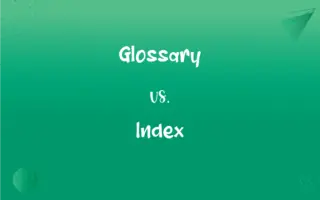Volatile Oil vs. Fixed Oil: What's the Difference?
Edited by Aimie Carlson || By Janet White || Published on January 13, 2024
Volatile oils evaporate at room temperature and are aromatic (e.g., essential oils), whereas fixed oils don't evaporate, are non-volatile, and leave a stain (e.g., vegetable oils).

Key Differences
Volatile oils are known for their ability to evaporate at room temperature. These oils, often used for their fragrance, contrast with fixed oils, which are heavier and do not evaporate under normal conditions.
Fixed oils are characterized by their non-volatile nature and tendency to leave a stain on paper. Unlike volatile oils, which dissipate without leaving a residue, fixed oils are used for their lubricating and moisturizing properties.
Volatile oils are primarily used in aromatherapy, perfumes, and flavorings. Their distinct aromas differentiate them from fixed oils, which are used in cooking, cosmetics, and as carrier oils.
Extraction methods for volatile oils often involve distillation. In contrast, fixed oils are usually extracted through pressing, such as olive or coconut oil.
In terms of chemical composition, volatile oils contain compounds like terpenes and esters. Fixed oils, on the other hand, are composed of triglycerides and do not contain volatile compounds.
ADVERTISEMENT
Comparison Chart
Evaporation
Evaporates at room temperature
Does not evaporate, non-volatile
Residue
Leaves no stain, evaporates completely
Leaves a greasy stain
Primary Use
Aromatherapy, perfumes, flavorings
Cooking, lubrication, cosmetics
Extraction Method
Typically distilled
Pressed from seeds or nuts
Chemical Composition
Contains terpenes, esters
Composed of triglycerides
ADVERTISEMENT
Volatile Oil and Fixed Oil Definitions
Volatile Oil
Used in making perfumes and flavorings.
Citrus volatile oil is a key ingredient in many perfumes.
Fixed Oil
A non-volatile oil that doesn't evaporate at room temperature.
Olive oil, a type of fixed oil, is used extensively in cooking.
Volatile Oil
A rapidly evaporating oil often used for its fragrance.
The volatile oil from lavender is popular in aromatherapy.
Fixed Oil
Leaves a greasy stain on paper.
When spilled, coconut fixed oil leaves a noticeable stain.
Volatile Oil
Contains natural aromatic compounds like terpenes.
The volatile oil in pine needles contains terpenes.
Fixed Oil
Extracted from seeds or nuts by pressing.
Almond fixed oil is obtained through the pressing of almonds.
Volatile Oil
Often referred to as essential oils in aromatherapy.
Eucalyptus volatile oil is widely used for its medicinal properties.
Fixed Oil
Comprised mainly of triglycerides.
Sunflower fixed oil contains a high concentration of triglycerides.
Volatile Oil
Extracted from plants, typically by distillation.
The volatile oil was extracted from rose petals through steam distillation.
Fixed Oil
Commonly used in cooking, cosmetics, and as carrier oils.
Jojoba fixed oil is popular in cosmetic formulations.
FAQs
What defines a volatile oil?
Volatile oils evaporate at room temperature and are fragrant.
Are fixed oils good for skin care?
Yes, many are used in moisturizers and cosmetics.
How are volatile oils extracted?
They're typically extracted through distillation.
Do volatile oils leave a stain?
No, they evaporate without leaving a residue.
Can fixed oils evaporate?
No, they do not evaporate at room temperature.
Are volatile oils the same as essential oils?
Yes, they are often referred to as essential oils.
Are volatile oils soluble in water?
No, they are generally not water-soluble.
What are fixed oils?
Fixed oils are non-volatile and leave a greasy residue.
What makes fixed oils different in cooking?
They add flavor and have a high boiling point.
Can volatile oils be used in cooking?
Generally, they're used for fragrance, not cooking.
What's a common use for fixed oils?
They're widely used in cooking and lubrication.
Is lavender oil a volatile oil?
Yes, it's a popular volatile oil used in aromatherapy.
Do fixed oils contain essential nutrients?
Many fixed oils are rich in essential fatty acids and vitamins.
How should volatile oils be stored?
In a cool, dark place to prevent degradation.
Are fixed oils used in salad dressings?
Yes, they are a key ingredient in many dressings.
Are fixed oils prone to rancidity?
Yes, they can become rancid if not stored properly.
Do volatile oils have therapeutic properties?
Many are used for their therapeutic effects in aromatherapy.
Can fixed oils be used as a carrier oil?
Yes, they are commonly used as carrier oils in aromatherapy.
Can volatile oils be used in diffusers?
Yes, they are commonly used in diffusers for aroma.
What is a common source of fixed oils?
Seeds and nuts are common sources.
About Author
Written by
Janet WhiteJanet White has been an esteemed writer and blogger for Difference Wiki. Holding a Master's degree in Science and Medical Journalism from the prestigious Boston University, she has consistently demonstrated her expertise and passion for her field. When she's not immersed in her work, Janet relishes her time exercising, delving into a good book, and cherishing moments with friends and family.
Edited by
Aimie CarlsonAimie Carlson, holding a master's degree in English literature, is a fervent English language enthusiast. She lends her writing talents to Difference Wiki, a prominent website that specializes in comparisons, offering readers insightful analyses that both captivate and inform.
































































